Recovery Principles in Mental Health: A Comprehensive Analysis
VerifiedAdded on 2022/09/05
|5
|1050
|23
Report
AI Summary
This report delves into the recovery principles applied in mental health practice, emphasizing patient well-being and individualized care. It outlines key principles, including the uniqueness of the individual, the importance of real choices, attitudes and rights, dignity and respect, partnership and communication, and the evaluation of recovery. The paper discusses how these principles are relevant to national standards and applicable in both government and community health services. It also highlights the practical application of these principles in healthcare facilities, particularly in psychiatry wards, focusing on the role of nurses in fostering therapeutic communication and creating positive environments for patients. The report concludes that the recovery principle model is an effective tool to enhance the condition of individuals with mental health issues, with a focus on patient-centered care and systematic guidance for practitioners.
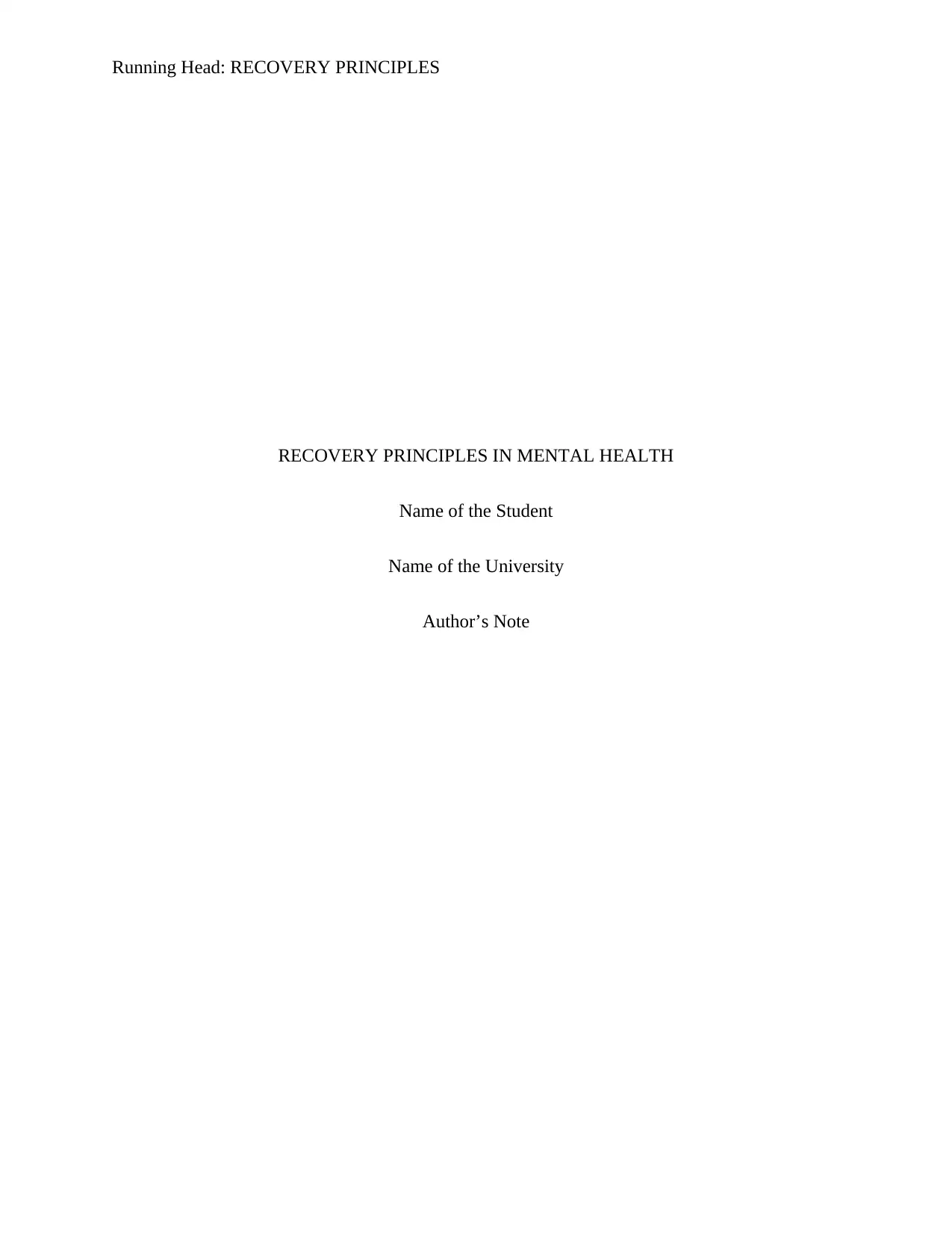
Running Head: RECOVERY PRINCIPLES
RECOVERY PRINCIPLES IN MENTAL HEALTH
Name of the Student
Name of the University
Author’s Note
RECOVERY PRINCIPLES IN MENTAL HEALTH
Name of the Student
Name of the University
Author’s Note
Paraphrase This Document
Need a fresh take? Get an instant paraphrase of this document with our AI Paraphraser
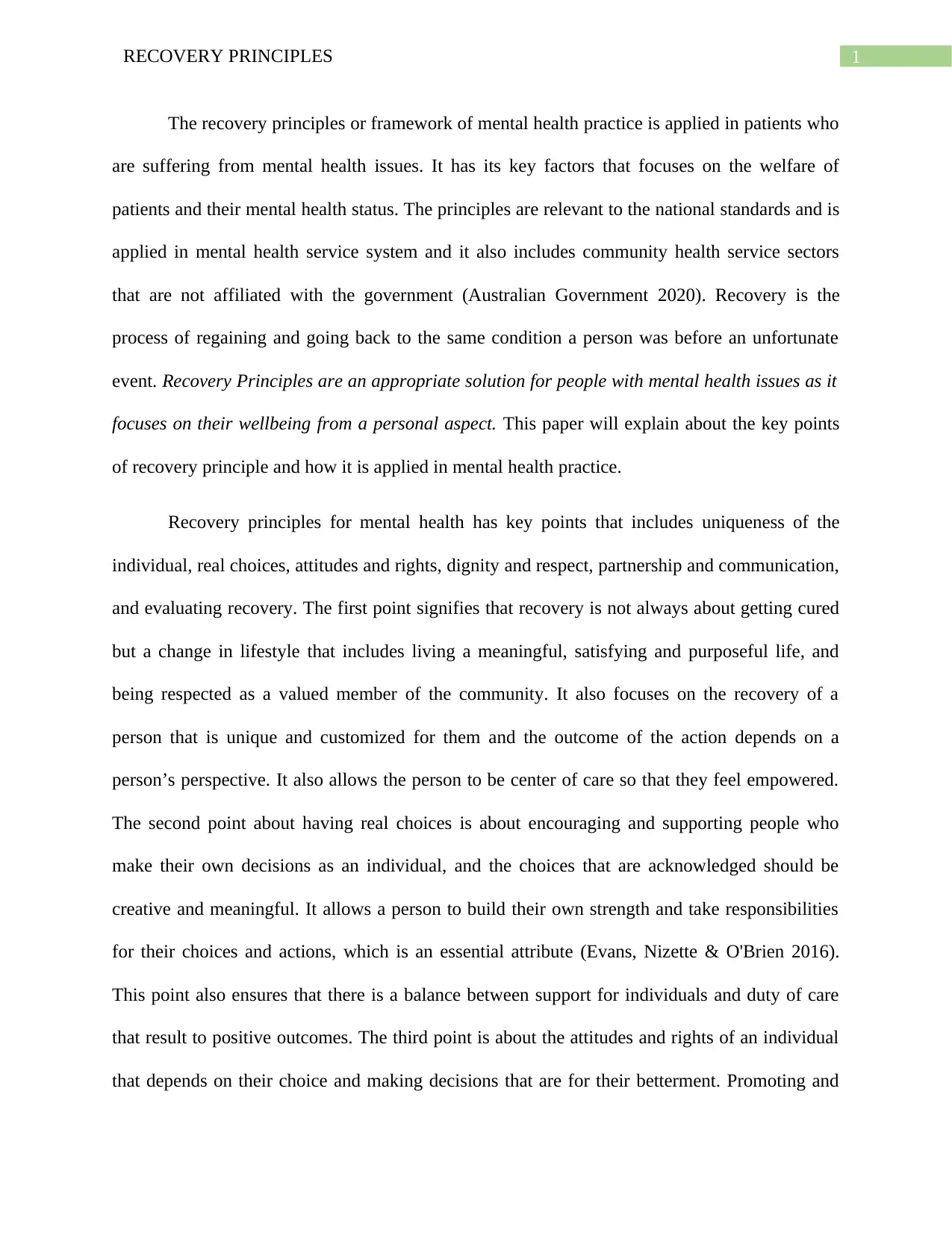
1RECOVERY PRINCIPLES
The recovery principles or framework of mental health practice is applied in patients who
are suffering from mental health issues. It has its key factors that focuses on the welfare of
patients and their mental health status. The principles are relevant to the national standards and is
applied in mental health service system and it also includes community health service sectors
that are not affiliated with the government (Australian Government 2020). Recovery is the
process of regaining and going back to the same condition a person was before an unfortunate
event. Recovery Principles are an appropriate solution for people with mental health issues as it
focuses on their wellbeing from a personal aspect. This paper will explain about the key points
of recovery principle and how it is applied in mental health practice.
Recovery principles for mental health has key points that includes uniqueness of the
individual, real choices, attitudes and rights, dignity and respect, partnership and communication,
and evaluating recovery. The first point signifies that recovery is not always about getting cured
but a change in lifestyle that includes living a meaningful, satisfying and purposeful life, and
being respected as a valued member of the community. It also focuses on the recovery of a
person that is unique and customized for them and the outcome of the action depends on a
person’s perspective. It also allows the person to be center of care so that they feel empowered.
The second point about having real choices is about encouraging and supporting people who
make their own decisions as an individual, and the choices that are acknowledged should be
creative and meaningful. It allows a person to build their own strength and take responsibilities
for their choices and actions, which is an essential attribute (Evans, Nizette & O'Brien 2016).
This point also ensures that there is a balance between support for individuals and duty of care
that result to positive outcomes. The third point is about the attitudes and rights of an individual
that depends on their choice and making decisions that are for their betterment. Promoting and
The recovery principles or framework of mental health practice is applied in patients who
are suffering from mental health issues. It has its key factors that focuses on the welfare of
patients and their mental health status. The principles are relevant to the national standards and is
applied in mental health service system and it also includes community health service sectors
that are not affiliated with the government (Australian Government 2020). Recovery is the
process of regaining and going back to the same condition a person was before an unfortunate
event. Recovery Principles are an appropriate solution for people with mental health issues as it
focuses on their wellbeing from a personal aspect. This paper will explain about the key points
of recovery principle and how it is applied in mental health practice.
Recovery principles for mental health has key points that includes uniqueness of the
individual, real choices, attitudes and rights, dignity and respect, partnership and communication,
and evaluating recovery. The first point signifies that recovery is not always about getting cured
but a change in lifestyle that includes living a meaningful, satisfying and purposeful life, and
being respected as a valued member of the community. It also focuses on the recovery of a
person that is unique and customized for them and the outcome of the action depends on a
person’s perspective. It also allows the person to be center of care so that they feel empowered.
The second point about having real choices is about encouraging and supporting people who
make their own decisions as an individual, and the choices that are acknowledged should be
creative and meaningful. It allows a person to build their own strength and take responsibilities
for their choices and actions, which is an essential attribute (Evans, Nizette & O'Brien 2016).
This point also ensures that there is a balance between support for individuals and duty of care
that result to positive outcomes. The third point is about the attitudes and rights of an individual
that depends on their choice and making decisions that are for their betterment. Promoting and
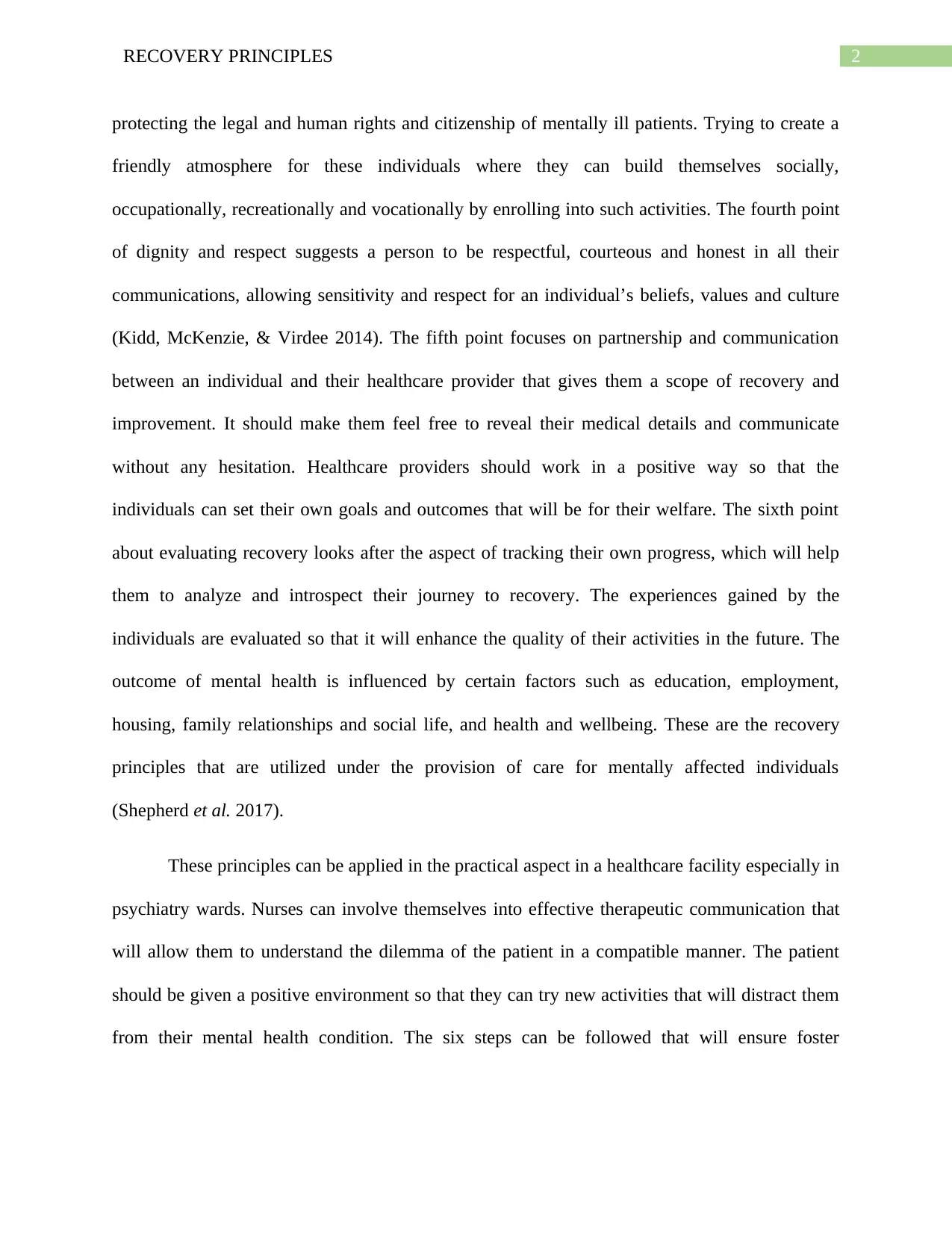
2RECOVERY PRINCIPLES
protecting the legal and human rights and citizenship of mentally ill patients. Trying to create a
friendly atmosphere for these individuals where they can build themselves socially,
occupationally, recreationally and vocationally by enrolling into such activities. The fourth point
of dignity and respect suggests a person to be respectful, courteous and honest in all their
communications, allowing sensitivity and respect for an individual’s beliefs, values and culture
(Kidd, McKenzie, & Virdee 2014). The fifth point focuses on partnership and communication
between an individual and their healthcare provider that gives them a scope of recovery and
improvement. It should make them feel free to reveal their medical details and communicate
without any hesitation. Healthcare providers should work in a positive way so that the
individuals can set their own goals and outcomes that will be for their welfare. The sixth point
about evaluating recovery looks after the aspect of tracking their own progress, which will help
them to analyze and introspect their journey to recovery. The experiences gained by the
individuals are evaluated so that it will enhance the quality of their activities in the future. The
outcome of mental health is influenced by certain factors such as education, employment,
housing, family relationships and social life, and health and wellbeing. These are the recovery
principles that are utilized under the provision of care for mentally affected individuals
(Shepherd et al. 2017).
These principles can be applied in the practical aspect in a healthcare facility especially in
psychiatry wards. Nurses can involve themselves into effective therapeutic communication that
will allow them to understand the dilemma of the patient in a compatible manner. The patient
should be given a positive environment so that they can try new activities that will distract them
from their mental health condition. The six steps can be followed that will ensure foster
protecting the legal and human rights and citizenship of mentally ill patients. Trying to create a
friendly atmosphere for these individuals where they can build themselves socially,
occupationally, recreationally and vocationally by enrolling into such activities. The fourth point
of dignity and respect suggests a person to be respectful, courteous and honest in all their
communications, allowing sensitivity and respect for an individual’s beliefs, values and culture
(Kidd, McKenzie, & Virdee 2014). The fifth point focuses on partnership and communication
between an individual and their healthcare provider that gives them a scope of recovery and
improvement. It should make them feel free to reveal their medical details and communicate
without any hesitation. Healthcare providers should work in a positive way so that the
individuals can set their own goals and outcomes that will be for their welfare. The sixth point
about evaluating recovery looks after the aspect of tracking their own progress, which will help
them to analyze and introspect their journey to recovery. The experiences gained by the
individuals are evaluated so that it will enhance the quality of their activities in the future. The
outcome of mental health is influenced by certain factors such as education, employment,
housing, family relationships and social life, and health and wellbeing. These are the recovery
principles that are utilized under the provision of care for mentally affected individuals
(Shepherd et al. 2017).
These principles can be applied in the practical aspect in a healthcare facility especially in
psychiatry wards. Nurses can involve themselves into effective therapeutic communication that
will allow them to understand the dilemma of the patient in a compatible manner. The patient
should be given a positive environment so that they can try new activities that will distract them
from their mental health condition. The six steps can be followed that will ensure foster
⊘ This is a preview!⊘
Do you want full access?
Subscribe today to unlock all pages.

Trusted by 1+ million students worldwide
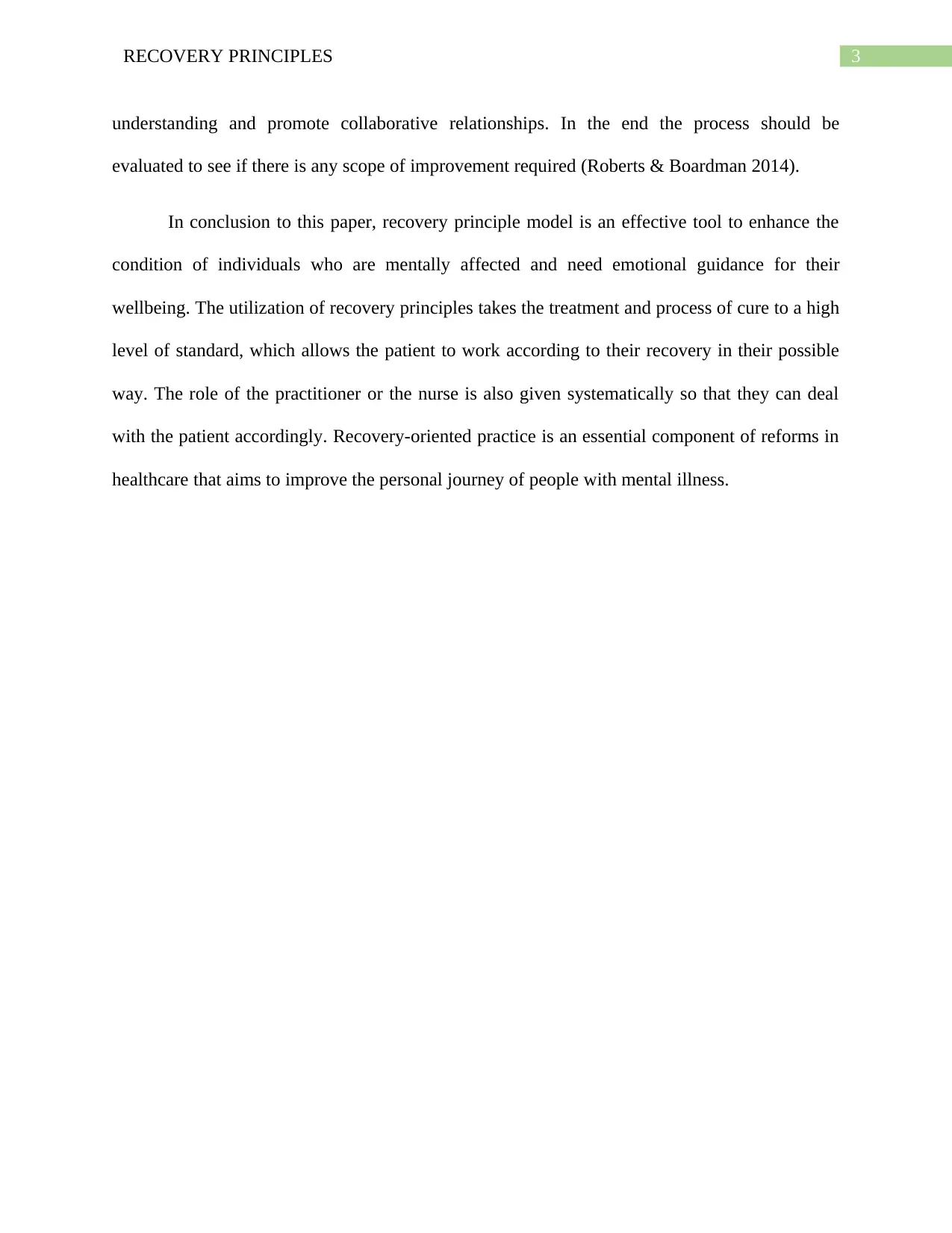
3RECOVERY PRINCIPLES
understanding and promote collaborative relationships. In the end the process should be
evaluated to see if there is any scope of improvement required (Roberts & Boardman 2014).
In conclusion to this paper, recovery principle model is an effective tool to enhance the
condition of individuals who are mentally affected and need emotional guidance for their
wellbeing. The utilization of recovery principles takes the treatment and process of cure to a high
level of standard, which allows the patient to work according to their recovery in their possible
way. The role of the practitioner or the nurse is also given systematically so that they can deal
with the patient accordingly. Recovery-oriented practice is an essential component of reforms in
healthcare that aims to improve the personal journey of people with mental illness.
understanding and promote collaborative relationships. In the end the process should be
evaluated to see if there is any scope of improvement required (Roberts & Boardman 2014).
In conclusion to this paper, recovery principle model is an effective tool to enhance the
condition of individuals who are mentally affected and need emotional guidance for their
wellbeing. The utilization of recovery principles takes the treatment and process of cure to a high
level of standard, which allows the patient to work according to their recovery in their possible
way. The role of the practitioner or the nurse is also given systematically so that they can deal
with the patient accordingly. Recovery-oriented practice is an essential component of reforms in
healthcare that aims to improve the personal journey of people with mental illness.
Paraphrase This Document
Need a fresh take? Get an instant paraphrase of this document with our AI Paraphraser
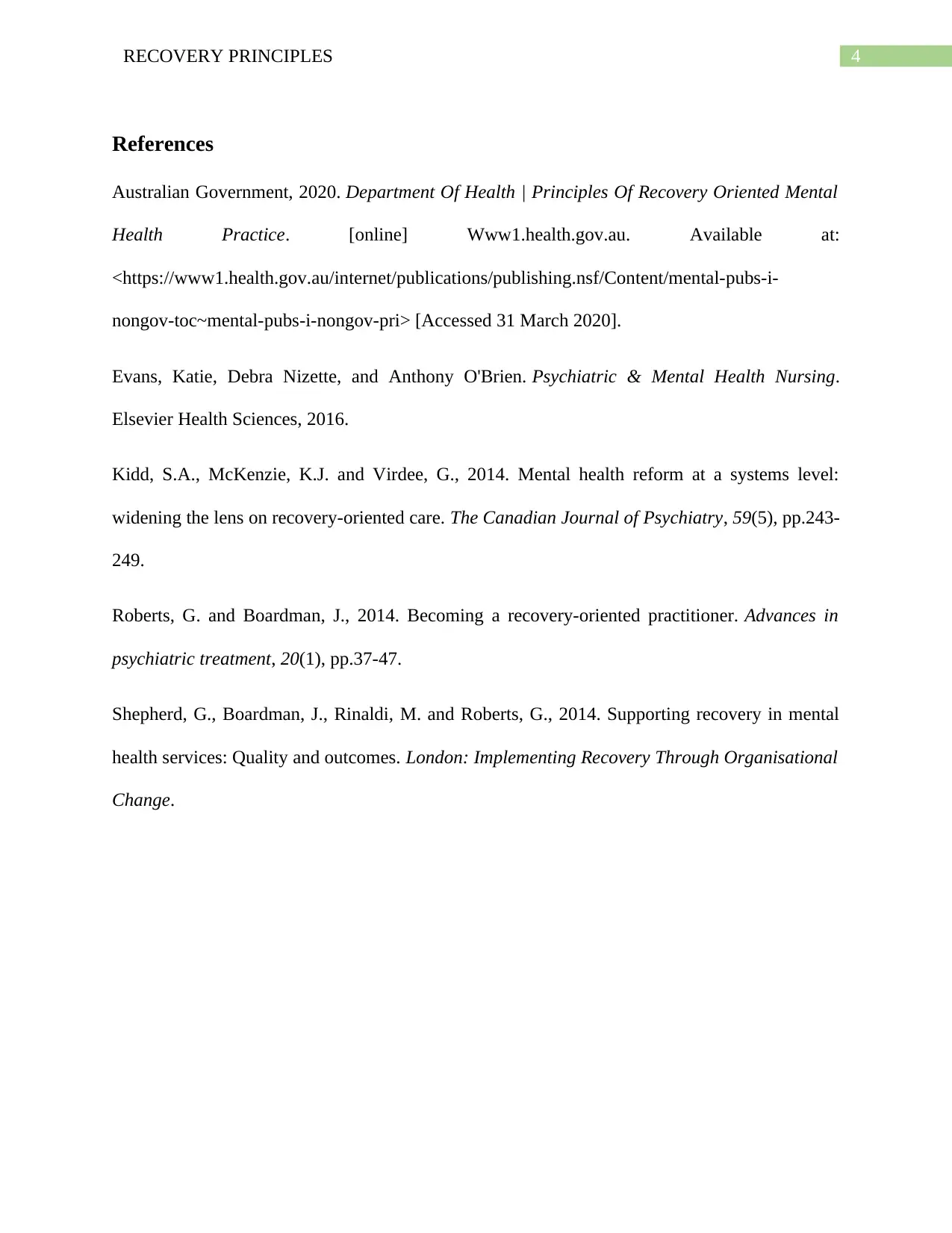
4RECOVERY PRINCIPLES
References
Australian Government, 2020. Department Of Health | Principles Of Recovery Oriented Mental
Health Practice. [online] Www1.health.gov.au. Available at:
<https://www1.health.gov.au/internet/publications/publishing.nsf/Content/mental-pubs-i-
nongov-toc~mental-pubs-i-nongov-pri> [Accessed 31 March 2020].
Evans, Katie, Debra Nizette, and Anthony O'Brien. Psychiatric & Mental Health Nursing.
Elsevier Health Sciences, 2016.
Kidd, S.A., McKenzie, K.J. and Virdee, G., 2014. Mental health reform at a systems level:
widening the lens on recovery-oriented care. The Canadian Journal of Psychiatry, 59(5), pp.243-
249.
Roberts, G. and Boardman, J., 2014. Becoming a recovery-oriented practitioner. Advances in
psychiatric treatment, 20(1), pp.37-47.
Shepherd, G., Boardman, J., Rinaldi, M. and Roberts, G., 2014. Supporting recovery in mental
health services: Quality and outcomes. London: Implementing Recovery Through Organisational
Change.
References
Australian Government, 2020. Department Of Health | Principles Of Recovery Oriented Mental
Health Practice. [online] Www1.health.gov.au. Available at:
<https://www1.health.gov.au/internet/publications/publishing.nsf/Content/mental-pubs-i-
nongov-toc~mental-pubs-i-nongov-pri> [Accessed 31 March 2020].
Evans, Katie, Debra Nizette, and Anthony O'Brien. Psychiatric & Mental Health Nursing.
Elsevier Health Sciences, 2016.
Kidd, S.A., McKenzie, K.J. and Virdee, G., 2014. Mental health reform at a systems level:
widening the lens on recovery-oriented care. The Canadian Journal of Psychiatry, 59(5), pp.243-
249.
Roberts, G. and Boardman, J., 2014. Becoming a recovery-oriented practitioner. Advances in
psychiatric treatment, 20(1), pp.37-47.
Shepherd, G., Boardman, J., Rinaldi, M. and Roberts, G., 2014. Supporting recovery in mental
health services: Quality and outcomes. London: Implementing Recovery Through Organisational
Change.
1 out of 5
Related Documents
Your All-in-One AI-Powered Toolkit for Academic Success.
+13062052269
info@desklib.com
Available 24*7 on WhatsApp / Email
![[object Object]](/_next/static/media/star-bottom.7253800d.svg)
Unlock your academic potential
Copyright © 2020–2026 A2Z Services. All Rights Reserved. Developed and managed by ZUCOL.





